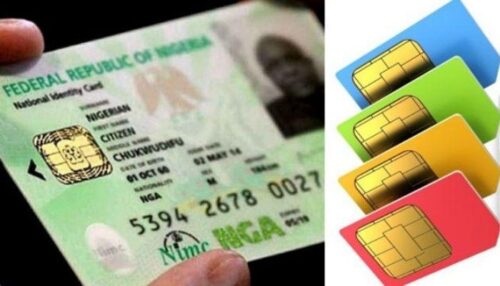he House of Representatives has initiated a formal investigation into allegations that certain telecommunications companies in Nigeria have been linking subscribers’ National Identification Numbers (NINs) to their SIM cards without obtaining proper consent.
This move comes after a motion was jointly sponsored during Wednesday’s plenary session by Patrick Umoh, representing the Ikot Ekpene/Essien Udim/Obot Akara Federal Constituency, and Julius Ihonvbere of Owan Federal Constituency. The lawmakers expressed deep concerns over the potential security risks and violations of data privacy associated with these unauthorized linkages.
Violation of Data Privacy Laws and Security Concerns
Leading the debate, Umoh highlighted the alarming implications of such actions, describing them as a breach of the Nigeria Data Protection Act, 2023, and the Nigeria Data Protection Regulation (NDPR), 2019—both of which safeguard the privacy and personal data of Nigerian citizens.
“The National Identification Number was designed to streamline the verification process, enhance security, and prevent identity-related crimes. However, unauthorized linking of NINs exposes Nigerians to serious risks, including identity theft, financial fraud, and cybercrime,” Umoh warned.
He emphasized that innocent individuals have already faced legal troubles, reputational damage, and harassment due to SIM cards allegedly linked to their identities without their knowledge. This, he argued, not only undermines public trust in the system but also jeopardizes the fundamental right to data privacy.
Mandate for Investigation
In response to the motion, the House directed its Committees on Communications and Interior to conduct an in-depth investigation into the matter. The committees have been given four weeks to report back with their findings and recommendations for further legislative action.
Additionally, the House called on the Nigerian Communications Commission (NCC) to launch its own inquiry into the activities of telecom operators and to take swift action against any service providers found guilty of unauthorized NIN-SIM linkages.

The National Identity Management Commission (NIMC) has also been asked to clarify whether these practices were sanctioned and if they comply with Nigeria’s existing data protection laws and regulatory frameworks.
Potential Risks and the Need for Accountability
Lawmakers stressed that beyond the legal implications, the unauthorized linking of NINs could have severe consequences for national security and the economy. The rise in cybercrime, financial fraud, and identity-related offenses in Nigeria has made data protection a critical issue.
“We cannot allow innocent citizens to bear the brunt of the negligence or deliberate misconduct of corporate entities. There must be accountability,” Ihonvbere stated during the plenary.
Broader Implications for Telecom Operators
This investigation adds to the growing scrutiny faced by telecom operators in Nigeria regarding data protection and subscriber management. The NIN-SIM linkage policy, introduced to improve security and reduce crime, has faced criticism over its implementation, with many Nigerians reporting issues related to data breaches, wrongful SIM deactivations, and privacy concerns.
As the House Committees begin their probe, the outcome could lead to stricter regulatory measures for telecom companies and possibly the introduction of new data protection guidelines to prevent similar occurrences in the future.


